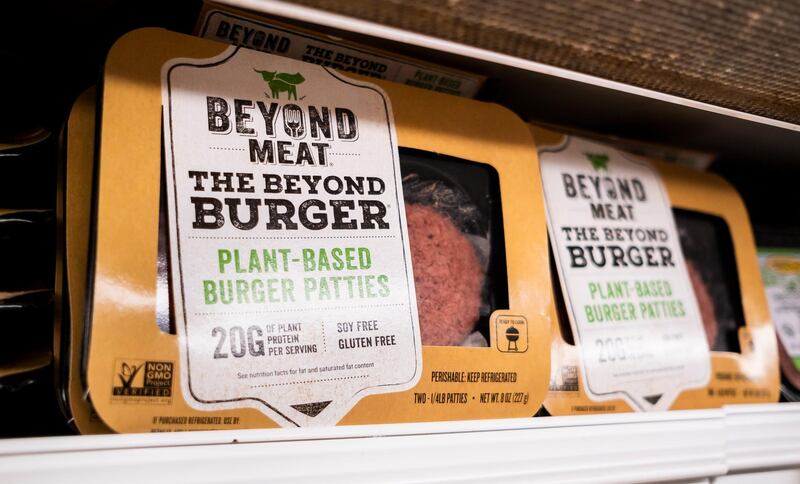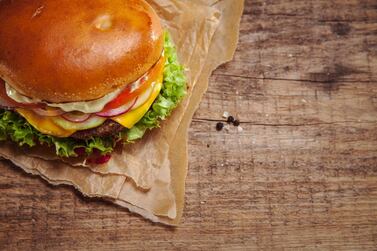For the past week or so, at least until Uber devoured the headlines, the market was buzzing about Beyond Meat, the US company famed for its plant-based burgers.
Having sunk their teeth into its IPO from day one - May 2 - ravenous investors watched the company’s stock sizzle to a positively succulent 148 per cent up by the end of last week.
Beyond Meat has fascinated the market for several reasons. After overcoming pea-protein supply issues, the company has set about convincing meat eaters that a viable non-carnivorous option exists. In creating a product that waves goodbye to the dry, limp, tasteless veggie burgers of yesteryear, they have also convinced retailers and restaurants that theirs is an idea worth chewing over.
For the US, the world’s largest beef producer as well as consumer, this is a big deal. America is, after all, the land of cowboys, not to mention chains like McDonald's, Burger King and Arby’s, whose advertising loudly proclaims: “We have the meats!”
“We have the non-meat alternative!” might not roll off the tongue, but the idea of mainstream America embracing a vegan option is certainly intriguing.
The UAE is no stranger to meat-free burgers. Back in February, plant-based meat substitutes were firmly on the menu at the UAE’s Gulfood exhibition, while Applebee’s in Dubai has started serving plant-based burgers manufactured by Moving Mountains Burger.
Good nutrition is part of this story. One recent US Department of Health & Human Services study showed that, compared to people eating diets rich in white meat such as fish and poultry or plant-based protein, those with diets rich in red meat such as beef and mutton had triple the levels of chemicals linked to heart disease.
Personally, I’m willing to overlook the health benefits and tuck into the occasional juicy beef burger, but there are other considerations with longer-term significance.
The UAE imports 90 per cent of its food produce, including live animals and meat. A report by the UN’s Food and Agriculture Organisation (FAO) found that, on average, UAE residents each consumed about 73.2kg of meat per year, ranking them among the highest consumers of meat worldwide. It also predicts that meat consumption could increase by up to 70 per cent by 2050.
The UAE also has the highest per capita water consumption of any country in the world. According to the Water Footprint Network, if a UAE resident avoided meat for just two days a week, it would save the equivalent of their annual water usage.
Meat production is inherently inefficient. Producing 1,500 calories worth of meat, or about 1kg, creates around 46kg of CO2 emissions. Apply that same formula to producing rice, and you will create 54,000 calories worth of the stuff. That's enough to feed 27 adults for a day; a kilogram of meat will barely feed one.
Consider instead the numbers that Beyond Meat’s rival, Impossible Burger, posits for its patties: it claims one of its burgers requires 95 per cent less land and 14 per cent less water than a beef burger, and reduces greenhouse gas emissions by 87 per cent.
Those numbers relate to another pressing UAE issue: the country is heavily reliant on a handful of nations, one of which is Brazil, for animal-based products. Brazil has a keen eye on the Arabian Gulf region and has been working with the Dubai-based International Halal Accreditation Forum (IHAF) to unify halal certifications. According to Fambras Halal, Brazilian halal food exports grew by around 10 per cent last year, rising to almost $5 billion.
Good news for carnivores, perhaps; but the rate at which Brazil's forests are disappearing is profoundly alarming. Among the main culprits of deforestation is, of course, cattle farming.
According to Global Forest Watch, from 2001 to 2017, Brazil lost 50.9 million hectares of tree cover, equivalent to a 9.8 per cent decrease since 2000 and 4.21Gt of CO₂ of emissions.
The UAE is among the countries most vulnerable to climate change. By deepening its dependency on meat imports from Brazil, it may be contributing to one of its own most pressing problems.
The UAE famously has a Minister of State of Food Security, and Mariam Al Mehairi has helped the country carve out a deserved reputation for agricultural innovation. She has been warning of the need to develop strategies for a sustainable future and to bring issues such as climate change to the fore.
Eye-catching projects in the UAE are making real progress in sustainable agriculture. The Abu Dhabi Food Control Authority’s Protected Agriculture Project, which uses UV-ray treated recycled water and an inbuilt cooling system to grow plants without contributing to climate change, is one. There are now as many as 1,000 UAE farms operating hydroponic greenhouses. The sector is vibrant.
In this context, the enthusiasm around Beyond Meat’s IPO may point to a mouth-watering opportunity. Whereas the idea of the UAE becoming self-sufficient in rearing livestock might be rather far-fetched, the idea of its agricultural innovation placing it at the vegan vanguard is less so.
By growing burgers in its own backyard, perhaps the UAE could become a meat-alternative production hub – and help tackle one of its meatiest challenges in the process.
First Move with Julia Chatterley airs Monday-Friday at 6pm on CNN International







